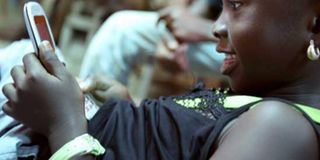Parents now cautioned over children’s digital addiction

PHOTO|INTERNET
What you need to know:
- Digital addiction, according to experts, is a real and growing condition that can take the form of smartphone or cellphone addiction, social media addiction, or internet addiction.
- This can have severe effects to a child’s development in school and his or her future life, experts warn.
Dar es Salaam. Lack of information among most parents on the effects of the use of digital devices to their children has been cited as a problem, which would drive the young generation into digital addiction.
Digital addiction, according to experts, is a real and growing condition that can take the form of smartphone or cellphone addiction, social media addiction, or internet addiction.
This can have severe effects to a child’s development in school and his or her future life, experts warn.
In an effort to voice the issue and fill the existing information gap, a group of concerned experts comprising medical doctors, psychiatrists, researchers, educators and clinical psychologists decided to show a documentary called Screen Agers: Growing up in the Digital Age, which took place from Friday and Saturday last week at the Little Theatre Oysterbay.
The Award-winning documentary released last year by a filmmaker Delaney Ruston, probes into the vulnerable corners of family life, including the director’s own, and depicts messy struggles, over social media, video games, academics and internet addiction.
The screening was attended by both parents and their children followed by discussion led by a panel of both experts of child development and digitalisation and officials from the Tanzania Communication Regulatory Authority (TCRA).
Speaking on the sideline, a psychiatrist from the Muhimbili National Hospital and a co-organiser of the screening, Dr Pamela Kaduri said although the documentary was filmed in the US, it is still relevant in the country’s environment as the effects of digital addiction can be to anyone no matter where he or she lives. She said the excessive use of digital devices by a child can be as bad to the child’s brain as taking heroine or other drugs.
“Once a child is used to gadgets when he or she misses them, he or she becomes unhappy and furious to the extent that he or she can even engage in a fight just because they want a smartphone to play games,” said Dr Kaduri.
Dr Namala Mkopi, a Consultant Child Health Specialist from the Muhimbili National Hospital, told the parents that prevention is better than cure.
“For those children that are not yet exposed to screen its better we keep the devices off them altogether. It’s absolutely prohibited to expose a less than 2-year old baby to the screen.”
For those already exposed, according to Dr Mkopi, the parents should slowly try to disengage them from the screen and instead introduce them to physical activity like exercises.
However, there is a still a need to undertake a local study in order to realize how far has the digital exposure impacted the country’s young population and finding a better and concrete ways of dealing with a problem from within.
“I think we need to have more research done locally on the issue of digital addiction and their effects to teenage because we don’t know enough about it,” said Dr Sheryl McCurdy, the Associate Professor at the Univesity of Texas Health Science Center.
“We need to how many kids own and use smartphones and what contents do they expose themselves to in them and finding it out if this can be another way of teaching and parenting in the digital age.”



